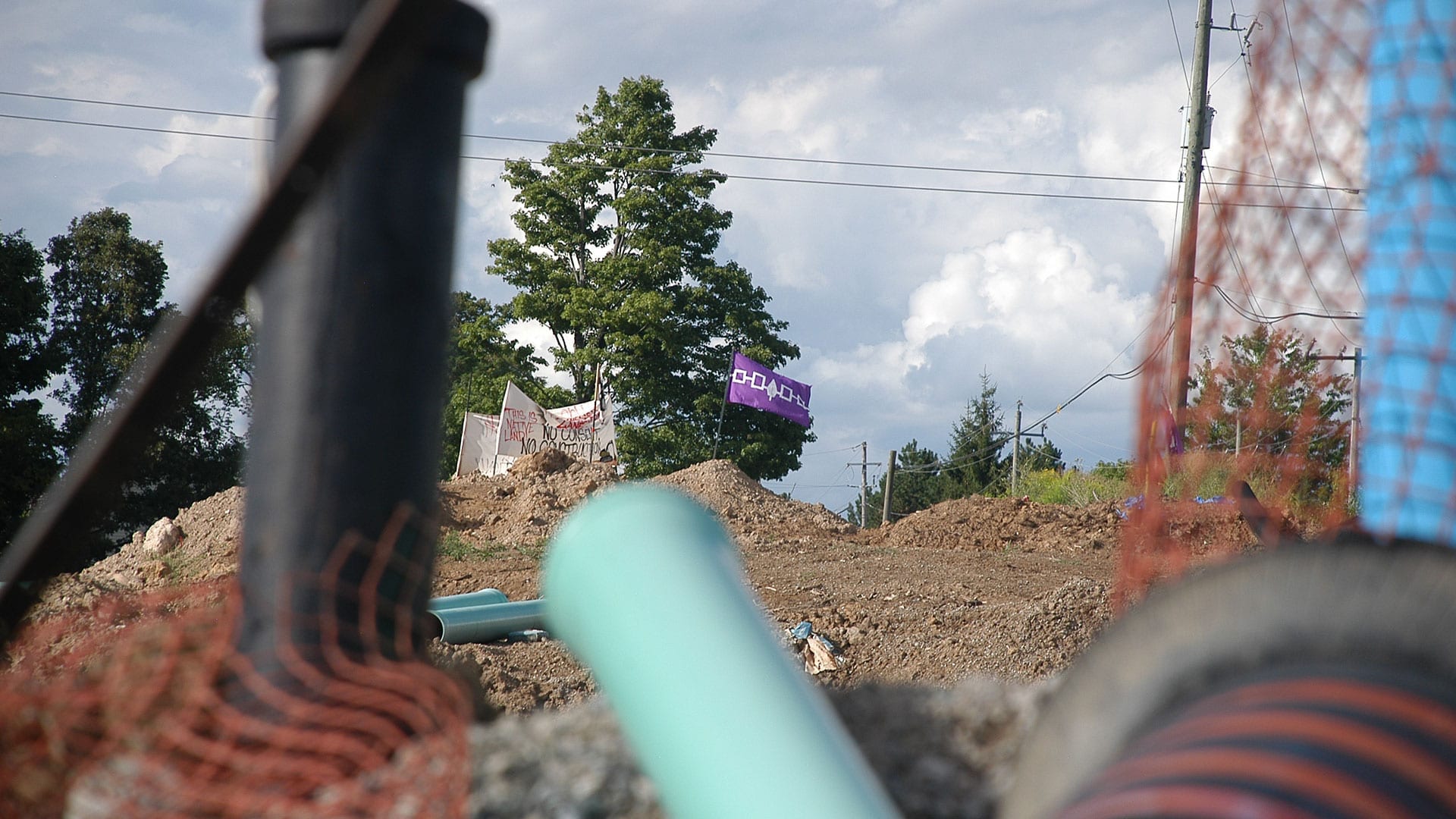
Skyler Williams walking towards the main blockade at 1492 Land Back Lane at Caledonia in 2020. Photo: APTN file
The Ontario Superior Court of Justice will consider whether or not to permanently extend two injunctions that prohibit anyone from interfering with construction of the McKenzie Meadows subdivision in Caledonia or blocking roads in the municipality of Haldimand County southwest of Toronto.
Six Nations of the Grand River members and supporters have occupied the site for 83 days with 27 people charged.
Skyler Williams was named on the injunctions on Aug. 25 after lawyers identified him as a “protest leader” in court.
Approximately 12 people moved on to the construction site on July 19, reclaiming it as Six Nations land for which no lawful surrender exists.
The judge is expected to hear arguments on both sides of the land dispute with Williams self-representing on Friday.
In his filings, Williams contends that the development has little general support among the Six Nations of the Grand River community.
His affidavit states the company Foxgate Developments ought to have anticipated the risk of developing the land given the longstanding land dispute over the Haldimand Tract and the community’s well-documented history of direct action through protests and occupations.
“If an injunction is granted and the developer finishes building the homes, the land will be gone from Six Nations. Land in which myself and my people have an intrinsic connection to,” said Williams.
“With the added context of Reconciliation, this development must be seen as being yet another instance in an ongoing history of colonial land theft and genocide, that it is people from Six Nations who are facing the greater harm if this matter is decided against their interests.”

In his affidavit, senior executive William Liske says Foxgate accommodated Six Nations Elected Council despite being under no obligation to do so. He points to ongoing support from the elected council for the development as well as a Crown land grant that shows the disputed parcel has been possessed by third parties since 1853.
“It is incorrect to state that Foxgate knew or ought to have known that there were risks in proceeding, particularly in term of a risk of blockade, occupation and intimidation by a group of individuals that have openly defied the Court Orders, have operated outside of the law and have openly rejected the legal process,” he said.
“It is necessary that the interim injunction now be extended on a permanent basis in order to allow the approved development to proceed without further delay and avoid risk of further obstruction.”
Haldimand Mayor Ken Hewitt says he’s “encouraged” by affidavits submitted and expects Justice John Harper will rule in favour of Foxgate and the municipality, who each hold one injunction.
“I am confident that the Judge will uphold the injunctions permanently and further that those involved will ultimately be arrested and will face the appropriate charges,” Hewitt said in a statement posted online.
‘They assert this as a land claim. It is not a land claim’
In a past decision, called an endorsement, the judge explained why he issued the injunctions.
Based on evidence, he said that the case was one of trespassing in which no Aboriginal title, treaty right or claim to the disputed parcel had been asserted.
“In the case before me, there have been no aboriginal rights asserted,” Harper wrote. “They assert, in the media only, that this land was never ceded by the Haudenosaunee. They assert this as a land claim. It is not a land claim.”
Despite launching 29 land claims in the past, the Six Nations only have one open claim. It’s an accounting for cash, land and assets owed them by the Crown for alleged misdealing along the Grand River.

Williams also filed a report on community consultations that took place in 2013 to assess support for the McKenzie Meadows development.
The sessions were poorly attended and the development was rejected by a majority who did. Seventy-nine people went with 12 supporting, 54 opposing and the others undecided or non-community members.
“Don’t sell out our future children’s land,” one person wrote.
“We (Six Nations) need our land base. There is no amount of money that is even close to be agreed upon that will compensate for what Canada owes us,” said another.
Those who supported often did so because funds from the agreement were proposed to go toward a school.
“It is recommended that the Six Nations Elected Council not proceeding (sic) with this development,” the report concluded. The band council then accepted the conclusion.
But that changed in 2018, when the elected council moved to support Foxgate’s proposed development.
“The 108 acres of developable land along McKenzie Road in Caledonia would not be able to be legally reclaimed,” the council explained in meeting minutes dated June 4, 2019.
Chief Ava Hill signed the agreement to support the development two weeks later.
The elected council explained that the Six Nations would not be able to have the disputed parcel returned based on legal precedent set by the Ontario Court of Appeal in the Chippewas of Sarnia case from 2000.
The court said the First Nation couldn’t have the land returned “from innocent third parties,” even if it was obtained through illegal surrender, due to the passage of time.
Court also heard from the OPP and Haldimand County on Aug. 25. They are expected to appear again.
More to come.









